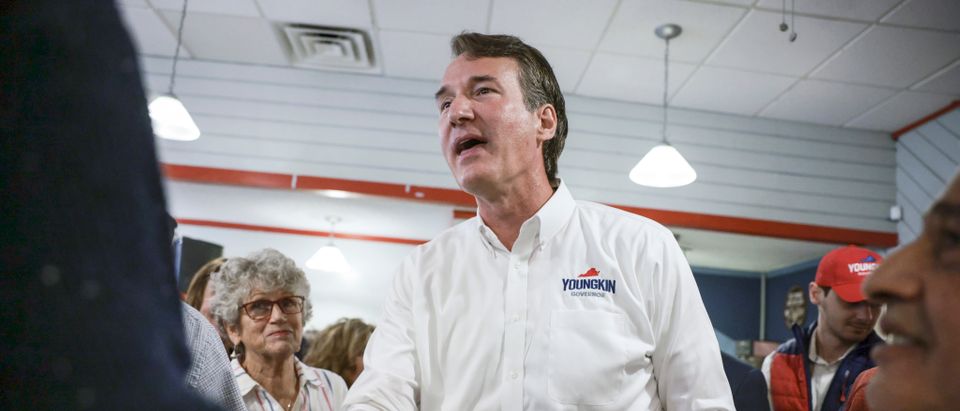Glenn Youngkin is set to become the first Republican to win statewide office in Virginia since 2009. Youngkin’s victory is also the first major rebound for the GOP after the double whammy of losing the presidency and the Senate in 2020 and early 2021.
Cue the commentators scrambling to explain what this election means for the future of the Republican Party.
On one side, the MAGA wing of the party will claim that Donald Trump’s support for Youngkin and the extreme popularity the former president retains in the party’s base helped push Youngkin over the edge. Trump himself has already claimed at least partial credit for the win. On the other side, moderates and anti-Trumpers will argue that since Youngkin kept Trump at arm’s length throughout the race, he resisted calls to campaign with Trump, the party is better off with him gone.
In reality, this election didn’t show that Trump is still the kingmaker of the Republican Party or that it’s time to return to the milquetoast conservatism of Mitt Romney or Jeb Bush. Instead, it highlighted the triumph of basic political common sense and, let’s face it, luck on the part of the GOP.
Youngkin won because he was the right candidate for the right state at the right time. He was most certainly not Trump, and refrained from launching petty personal attacks against his opponent or diving head first into the media frenzy. In other words, Youngkin didn’t make stupid mistakes.
But his opponent did. Former Gov. Terry McAuliffe spent the vast majority of his campaign trying to tie Youngkin to Trump, hoping that the voters in the Richmond area and the D.C. adjacent counties would be blinded by their hatred of the orange man enough to ignore the fact that his campaign had very little substance. But anyone with eyes and ears can recognize that Youngkin is unlike Trump in almost every way.
He also made perhaps one of the biggest political blunders of the past few years when he said, out loud, in public, with a straight face, that “I don’t think parents should be telling schools what they should teach.”
He then doubled down on his self-sabotage by inviting Randi Weingarten, teachers union president and one of the people most responsible for keeping children out of school for over a year, to come speak before an anemic crowd the day before the election. Weingarten is also a fan of telling parents that they have absolutely no say in what is taught to their children using their tax dollars.
Suburban white women, aka moms, flocked to Youngkin in droves the next day.
The explosive accusations coming out of Loudoun County regarding sexual assaults in bathrooms and the ridiculous curricula being forced on young children was the hot button issue of the entire campaign. While Youngkin jumped on the issue and took democrats to task for their attempts to push blatantly racist ideology onto schoolchildren, McAuliffe preferred to pretend that it wasn’t happening.
And education was the second most important issue to Virginia voters, according to exit polls.
Biden’s piss-poor handling of the economy, the most important issue to VA voters, didn’t help McAuliffe either. Rampant inflation, the residual economic shocks from COVID lockdowns and the supply chain crisis would be difficult for even a stellar Democratic candidate to sail past.
So, a measured candidate in the form of Youngkin, a bad opponent in the form of McAuliffe, a poor economic performance on the part of the national Democratic administration and a hot button issue that disadvantaged the Democrats led to the GOP win in Virginia.
But it was still extremely close — less than two points separated Youngkin’s victory and another four years of Democratic rule in the state.
A Trump-esque candidate just isn’t viable in Virginia right now. Exhibit A is Corey Stewart’s shellacking in the 2018 Virginia Senate race, where Tim Kaine won by 16 points. But neither is an establishment Republican whose entire political strategy comprises tired buzzwords like “socialism” and “tax cuts” to drum up die hard free marketers. Ed Gillespie was humiliated in the 2017 gubernatorial race after running just such a campaign.
For Virginia, the appropriate candidate was someone who wasn’t afraid to seize on the important issues of the day while maintaining the baseline Reagan conservatism. Admittedly, that’s not going to work everywhere. In ruby red states like Mississippi, Alabama or Kentucky, a MAGA candidate is going to have a much better chance at winning than a moderate, while the opposite is probably true in more moderate states like Pennsylvania, Nevada or Arizona.
Trump’s support will continue to represent a massive boon for candidates in red states, while Republicans in purple and traditionally blue states will have to tread more carefully. This will necessitate a more discerning strategy from the movement as a whole. Support MAGA-style candidates in MAGA states and more moderate candidates in
So, the result in Virginia is not a clarion call to ditch Trump from the movement or a sign that Trump’s seal of approval is required for every electoral victory. The real lesson for the GOP is to particularize its candidates and message to each state based on that state’s particular brand of conservatism.
This would seem like common sense, but again all you need to do is look at the candidates the Republican Party has put up in Virginia for the past few years to know that common sense is not always followed.
So, before you listen to someone trying to tell you that Virginia’s gubernatorial race is some bellwether for the conservative movement going into the 2022 midterms or, preposterously, the 2024 presidential election, remember the facts of the case in this election and how other elections have shaken out in the past.
Hayden Daniel is the opinion editor at the Daily Caller


